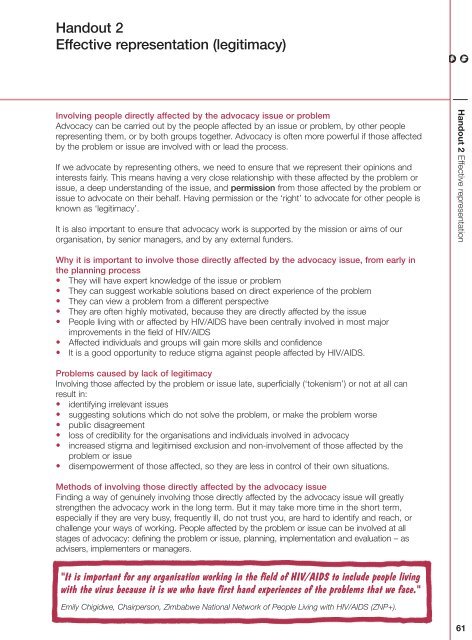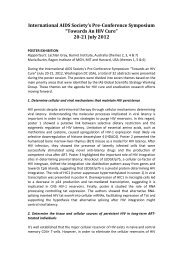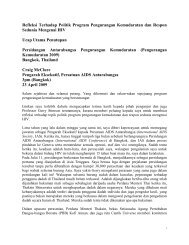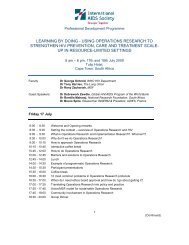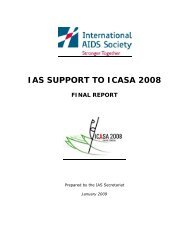Advocacy in Action - International AIDS Society
Advocacy in Action - International AIDS Society
Advocacy in Action - International AIDS Society
Create successful ePaper yourself
Turn your PDF publications into a flip-book with our unique Google optimized e-Paper software.
Handout 2<br />
Effective representation (legitimacy)<br />
Involv<strong>in</strong>g people directly affected by the advocacy issue or problem<br />
<strong>Advocacy</strong> can be carried out by the people affected by an issue or problem, by other people<br />
represent<strong>in</strong>g them, or by both groups together. <strong>Advocacy</strong> is often more powerful if those affected<br />
by the problem or issue are <strong>in</strong>volved with or lead the process.<br />
If we advocate by represent<strong>in</strong>g others, we need to ensure that we represent their op<strong>in</strong>ions and<br />
<strong>in</strong>terests fairly. This means hav<strong>in</strong>g a very close relationship with these affected by the problem or<br />
issue, a deep understand<strong>in</strong>g of the issue, and permission from those affected by the problem or<br />
issue to advocate on their behalf. Hav<strong>in</strong>g permission or the ‘right’ to advocate for other people is<br />
known as ‘legitimacy’.<br />
It is also important to ensure that advocacy work is supported by the mission or aims of our<br />
organisation, by senior managers, and by any external funders.<br />
Handout 2 Effective representation<br />
Why it is important to <strong>in</strong>volve those directly affected by the advocacy issue, from early <strong>in</strong><br />
the plann<strong>in</strong>g process<br />
• They will have expert knowledge of the issue or problem<br />
• They can suggest workable solutions based on direct experience of the problem<br />
• They can view a problem from a different perspective<br />
• They are often highly motivated, because they are directly affected by the issue<br />
• People liv<strong>in</strong>g with or affected by HIV/<strong>AIDS</strong> have been centrally <strong>in</strong>volved <strong>in</strong> most major<br />
improvements <strong>in</strong> the field of HIV/<strong>AIDS</strong><br />
• Affected <strong>in</strong>dividuals and groups will ga<strong>in</strong> more skills and confidence<br />
• It is a good opportunity to reduce stigma aga<strong>in</strong>st people affected by HIV/<strong>AIDS</strong>.<br />
Problems caused by lack of legitimacy<br />
Involv<strong>in</strong>g those affected by the problem or issue late, superficially (‘tokenism’) or not at all can<br />
result <strong>in</strong>:<br />
• identify<strong>in</strong>g irrelevant issues<br />
• suggest<strong>in</strong>g solutions which do not solve the problem, or make the problem worse<br />
• public disagreement<br />
• loss of credibility for the organisations and <strong>in</strong>dividuals <strong>in</strong>volved <strong>in</strong> advocacy<br />
• <strong>in</strong>creased stigma and legitimised exclusion and non-<strong>in</strong>volvement of those affected by the<br />
problem or issue<br />
• disempowerment of those affected, so they are less <strong>in</strong> control of their own situations.<br />
Methods of <strong>in</strong>volv<strong>in</strong>g those directly affected by the advocacy issue<br />
F<strong>in</strong>d<strong>in</strong>g a way of genu<strong>in</strong>ely <strong>in</strong>volv<strong>in</strong>g those directly affected by the advocacy issue will greatly<br />
strengthen the advocacy work <strong>in</strong> the long term. But it may take more time <strong>in</strong> the short term,<br />
especially if they are very busy, frequently ill, do not trust you, are hard to identify and reach, or<br />
challenge your ways of work<strong>in</strong>g. People affected by the problem or issue can be <strong>in</strong>volved at all<br />
stages of advocacy: def<strong>in</strong><strong>in</strong>g the problem or issue, plann<strong>in</strong>g, implementation and evaluation – as<br />
advisers, implementers or managers.<br />
"It is important for any organisation work<strong>in</strong>g <strong>in</strong> the field of HIV/<strong>AIDS</strong> to <strong>in</strong>clude people liv<strong>in</strong>g<br />
with the virus because it is we who have first hand experiences of the problems that we face."<br />
Emily Chigidwe, Chairperson, Zimbabwe National Network of People Liv<strong>in</strong>g with HIV/<strong>AIDS</strong> (ZNP+).<br />
61


